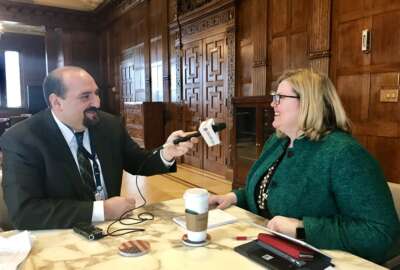

The General Services Administration wants to help vendors improve the quality of their future bid submissions through its new initiative, called INFORM.
Best listening experience is on Chrome, Firefox or Safari. Subscribe to Federal Drive’s daily audio interviews on Apple Podcasts or PodcastOne.
The perception that bid protests are mucking up the federal procurement process is one of those urban myths that will not die, like how Paul McCartney died in a car crash in 1966 or that the Air Force hides away UFOs in the desert.
Despite the fact that these “theories” are continually disproven, the myths just will not go away. Plenty of people swear they hear “Paul is dead” when you play “Revolution No. 9” backward.

For instance the most recent attempt to limit bid protests to improve acquisition is from the Section 809 panel. It recommended making substantial changes to the federal bid protest process by limiting vendors to filing before the Government Accountability Office or the Court of Federal Claims, but not both, as well as prohibiting protests of contracts for “readily available” products or services of less than $15 million.
The Senate Armed Services Committee a few years ago tried to “restrain” bid protests by making it harder on contractors to bring complaints before the GAO.
Despite the well-known fact that protests impact less than 1 percent of all procurement actions a year, there is this ever-present concern that bid protests are fouling up the system and a major part of the reason why federal contracting takes so long.
But what if the answer wasn’t changing the processes, but it was to make contracting officers, source selection committees and lawyers better communicators?
That is the goal of the latest initiative by the General Services Administration called INFORM, which stands for In-Depth Feedback through Open Reporting Methods.
“Our hypothesis is that giving offerors or industry more insight into why they did or did not receive a specific award will help them improve the quality of their future submissions. Our hope is that INFORM will deliver some of the same benefits through broader communication as evidenced with early engagement,” Jeff Koses, GSA’s senior procurement executive, wrote in a Feb. 7 blog post. “GSA’s current post-award communications are already more robust than those outlined in the Federal Acquisition Regulation (FAR). INFORM complements this by providing each offeror with an unsolicited customized evaluation statement, an opportunity for an in-person oral feedback meeting with the GSA evaluation team, and the option to submit written follow-up questions.”
What Koses really is talking about is enhanced debriefings, a process the Defense Department, the Department of Homeland Security and others have begun to implement.
Congress instructed DoD in the 2018 National Defense Authorization Act to give unsuccessful bidders more details in the form of written questions and answers. DoD issued a FAR deviation in March 2018 detailing the process and timelines.


 Exclusive
Exclusive GSA’s nine-month, 50-acquisition pilot is further recognition that talking to vendors about why they lost and what they can do better in the future has all sorts of benefits. Koses also issued a memo detailing how the INFORM pilot would work back in October, which included metrics for success.
“We anticipate that adding more information and transparency to the post-award communication process will improve offerors’ perception of the fairness and impartiality of GSA’s award decisions,” Koses said in the blog.
This is because the current approach isn’t working.
“Most debriefings handled through written, short explanations about why you lost, and they are totally ineffective,” said Rob Burton, an attorney with Crowell & Moring and former deputy administrator in the Office of Federal Procurement Policy. “They raise all sorts of questions for contractors which are never answered but many times only through the bid protest process.”
Burton has long been a supporter of enhanced debriefings, offering up one experience where he had to convince an agency to show him contracting documents or face a bid protest. When he finally saw the documents, Burton recommended to his client that they not protest because they couldn’t win.
“Bid protests have an enormous impact on agency personnel, lawyers and others,” he said. “But doing an enhanced debriefings for an hour or so will be much less time than supporting a bid protest process that could go on for an extended period of time.”
Experts praised GSA’s decision to take on enhanced debriefings. GSA Administrator Emily Murphy outlined improving debriefings as one of her initial priorities.
Charles Tiefer, a professor the University of Baltimore law school, said it’s clear industry is driving the need for enhanced debriefings. He said the standard, cookie-cutter written explanations just aren’t good enough these days, especially as the procurements become more complex.
Tiefer said he is concerned that contracting officers will be unhappy with enhanced debriefings because they already are overworked.
He said GSA and other agencies should come up with metrics that show the success of enhanced debriefings, such as decrease in the number of protests or the time it takes to prepare a detailed conversation compared to the time it takes to address a protest.
Michelle Currier, a professor of contract management at the Defense Acquisition University, said enhanced debriefings may not have a big impact on bid protests, but improved industry bids is the biggest benefit.
“We have to recognize that government is no longer the best and only game in town. We need to look for ways to make federal procurement more attractive for innovative and new companies to invest and help us solve our problems,” she said. “Industry has said they don’t learn anything of value in a standard debriefing to make us come and do it better. So the more conversations we have with industry, it will keep them encouraged to do business with us.”
Tim Cooke, president and CEO of ASI Government, said there are four specific things agencies should keep in mind as they do debriefings. ASI Government helps agencies prepare acquisitions and documents for post-award debriefings, but do not participate in the actual sessions.
“And keep the lawyers on the sidelines for both sides. Once they are in the game, they have to prove their value and it’s a drag,” Cooke said. “Fear of protest is the number one reason why more information isn’t shared. But if you have done a good job, then there is reason to hold back.”
And it’s that confidence that DoD, DHS and now GSA must exude during these enhanced debriefings.
Copyright © 2024 Federal News Network. All rights reserved. This website is not intended for users located within the European Economic Area.
Jason Miller is executive editor of Federal News Network and directs news coverage on the people, policy and programs of the federal government.
Follow @jmillerWFED
